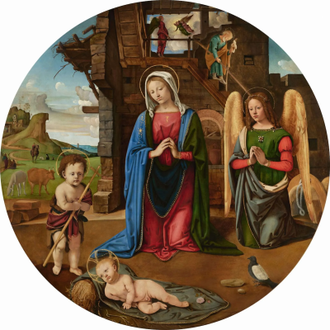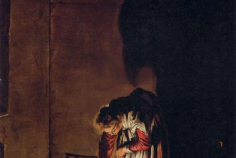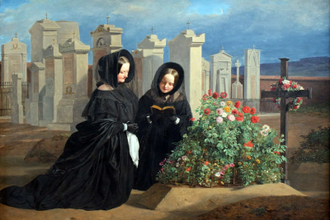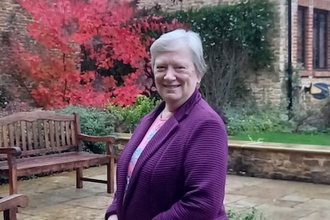Gospel in Art: The Nativity of Saint John the Baptist

The Nativity with the Infant Saint John, by Piero di Cosimo © National Gallery of Art, Washington
Source: Christian Art
Gospel of 24 June 2025
Luke 1:57-66, 80
The time came for Elizabeth to give birth, and she bore a son. And her neighbours and relatives heard that the Lord had shown great mercy to her, and they rejoiced with her. And on the eighth day they came to circumcise the child. And they would have called him Zechariah after his father, but his mother answered, 'No; he shall be called John.' And they said to her, 'None of your relatives is called by this name.' And they made signs to his father, enquiring what he wanted him to be called. And he asked for a writing tablet and wrote, 'His name is John.' And they all wondered. And immediately his mouth was opened and his tongue loosed, and he spoke, blessing God. And fear came on all their neighbours. And all these things were talked about through all the hill country of Judea, and all who heard them laid them up in their hearts, saying, 'What then will this child be?' For the hand of the Lord was with him.
And the child grew and became strong in spirit, and he was in the wilderness until the day of his public appearance to Israel.
Reflection on the painting
Only three birthdays are celebrated in the Church's liturgical calendar: the Nativity of Our Lord (December 25), the Nativity of his Mother (September 8), and the Nativity of his forerunner, John the Baptist, today, on 24 June. Furthermore, Saint John the Baptist is one of the few saints who have two feast days. Each year the Church celebrates both his birth on 24th June and his martyrdom on August 29th.
Piero di Cosimo's Nativity with Saint John the Baptist is painted as a tondo, a round format symbolic of eternity and divine perfection. While the Virgin Mary kneels in reverent adoration before the Christ Child, our attention is gently drawn to the young Saint John the Baptist, his small hand gripping a reed cross, the very symbol that will one day identify him as the forerunner of Christ. His expression is solemn and composed, almost contemplative, as he gazes toward the infant Jesus with a maturity beyond his years. Piero tenderly captures this moment of spiritual recognition: even as a child, John already knows the significance of the One lying in the straw.
In this composition, Saint John does not merely serve as a passive observer, he is prophet and witness, even in infancy. His presence here links the nativity to the future passion, just as the reed cross foreshadows the crucifixion. Unlike the grand crosses that will later be associated with Christ's crucifixion, the reed is simple and fragile, a humble symbol, echoing John's ascetic life in the wilderness. The scene unfolds with a rich layering of symbolism. The wheat beneath Christ's head, evokes the Eucharist, while roses and doves speak of purity and sacrifice. And yet, amidst all this theological weight, Piero infuses the moment with a touching humanity: Joseph, descends the building's wooden stairs in the cautious manner of an aged man. He is attended by angels bearing flowering branches to celebrate the Child's birth. In the distance at left, the three Magi walk in a serene landscape whose rolling contours perfectly complement the tondo's shape.
LINKS
Gospel in Art: https://christian.art/
Today's Reflection: https://christian.art/daily-gospel-reading/luke-1-57-66-80-2025/ (with audio)


















